- Home
- John Bellairs
Chessmen of Doom
Chessmen of Doom Read online
The Chessmen of Doom
A Johnny Dixon Mystery: Book Seven
John Bellairs
CHAPTER ONE
"Yes, my name is Childermass. And you are standing in my nasturtium bed. Kindly get your fat feet out of it, at once!"
It was a sunny mild May afternoon in the mid-1950's. Professor Roderick Childermass was sitting in a dirty yellow-and-green-striped lawn chair in the yard behind his house, and he was glaring at a young man who stood in an oblong bed of earth near the back porch. Professor Childermass was short, elderly, and cranky-looking. His nose was red and pitted, and his hair was white and unruly. Overgrown sideburns sprouted from both sides of his face, and his eyes glittered behind gold-rimmed spectacles. The young man wore the gray uniform of a post office employee, and in one hand he clutched a letter with a red-white-and-blue-striped sticker on it. With a sudden motion the postman extricated himself from the flower bed and held out the letter for the professor to take.
"Sorry, sir," he said apologetically. "I have a special-delivery letter here for you."
With a sigh the professor put down the glass of lemonade, heaved himself up out of the chair, and snatched the letter from the young man. "Special delivery, is it!" muttered the professor under his breath. "Hmm . . . well, thank you very much. Run along now." He made a shooing motion with his hand.
The young man muttered. Then he turned and left. The professor stuck his thumb under a corner of the envelope's flap and ripped. He pulled out the folded letter and shook it open with a single quick snap of his wrist. Then he began to read:
My dear Roderick:
Greetings! By the time you get this, I will be in the next world, if there is one. My body will be in its tomb, or green and festering in its shroud, as Shakespeare would say. But let's not dwell on unpleasant details: I'm dead, and I've left my estate in Maine to you. There are conditions that must be fulfilled, but then you've guessed that by now, haven't you, you clever old cuss? In a few days a lawyer will be calling you to tell what you have to do to inherit my ten million smackeroos. In the meantime, in between time, let me just leave you with this thought:
Why a dead eye in a room with no view? Why pallid dwarves on a board that's not true? To pull the hairy stars from their nest. And give sinful humans a well-deserved test.
If you solve this riddle you may wish that you hadn't. Hard times are ahead for the cruel and heartless Lords of War.
Yours ever,
Peregrine P. Childermass
The professor sat staring at this odd letter for a long time. He hated mysterious notes, and the longer he thought about this one, the madder he got. Of course, he was sorry that Peregrine was dead, but he was also angry at his brother because Peregrine had decided to play some kind of insane trick on him. "Peregrine, if you were here and alive, I'd belt you one in the snoot! he muttered, as he sipped lemonade and tried to calm down. The professor did not mind the idea of inheriting ten million bucks, but he wondered what "conditions" his batty brother had in mind in order for him to get the money. As for the little poem that had come with the letter, he did not have the faintest idea of what it meant. Nothing, probably.
A few days later the professor was across the street having Sunday dinner with his friends the Dixons and their grandson, Johnny. The Dixons were an elderly couple who had lived in Duston Heights, Massachusetts, for many years. One day their grandson John had come to live with them, because his mother was dead and his dad was fighting in the Korean War. Johnny was a short blond boy who wore glasses. He was brainy and shy and had trouble getting people to like him. Strangely enough he got along fine with cranky old Professor Childermass, who terrified most people. The two of them had become friends a few seconds after they met, and now the old man was like a second father to Johnny. They played chess and baked cakes and discussed the problems of the world together. It was an odd friendship, but it worked.
At the Dixons' the professor rambled on about the letter he had gotten. He stuffed mashed potatoes and roast beef into his mouth and went on and on about his brother Peregrine and the rest of his nutty family. The professor's father had taught literature at Princeton, and he had named his sons for characters in the novels of Tobias Smollett. There was Roderick Random, and Peregrine Pickle, and Humphrey Clinker, and even Ferdinand Count Fathom, who usually signed his name F. C. F. Childermass. All of the Childermass boys had turned out to be pretty strange—except, of course, for the professor himself. He was perfectly normal—at least, he said so.
As the professor rattled on, Johnny kept thinking about the four-line poem and the words at the end of the letter about the heartless Lords of War.
"Professor," he said suddenly, when the old man had paused to take a drink of water, "who are the Lords of War? Is he talking about people who make guns and bombs?"
The professor shrugged. "I suppose so," he muttered, "though I really can't be sure what anything in that blasted letter means. Peregrine claims that the Lords of War are in for hard times. Maybe he read the tea leaves in the bottom of his cup and decided that an era of peace was coming to the world. Peregrine was one of those people who get very upset about the horrors of war, and he always said that there ought to be some way to frighten human beings into being peaceful. That's a nice notion, isn't it? But not very practical. Someday the earth may be peaceful, but unless an angel with a flaming sword appears in the sky, I don't see how it's going to happen."
Grampa Dixon was sitting at the head of the table. He was a tall, gaunt old man with saggy cheeks and gold-rimmed spectacles. Grampa was kindly and timid and he usually kept silent when the professor was ranting on about something. Finally, however, he spoke up.
"Rod," he asked suddenly, "are you gonna take Perry's money if they offer it to ya?"
The professor rolled his eyes toward the ceiling. "It all depends," he said, "on what the conditions of his will are. If they ask me to sacrifice kittens on the altar of Baal, I probably won't take it. But if I have to put on a pink nightgown and run around town at midnight shouting, The British are coming! then I'll do it. We'll just have to see."
Later that evening Johnny was sitting in the professor's kitchen watching as the old man frosted a chocolate layer cake. The professor smeared dollop after dollop of rich fudge frosting. When the cake was done they were going to gorge on it, something they both very much enjoyed. But just as the professor was adding some more powdered sugar to the frosting in his mixing bowl, the phone rang. With the spatula in his hand he went over to the sideboard and picked up the receiver. The conversation that followed was punctuated by lots of "urns" and "ers" from the professor, but somehow Johnny figured out that the caller was somebody who had something to do with the late Peregrine Childermass's will. With a half-smothered curse the professor said goodbye and hung up. He turned to Johnny and sighed wearily.
"That was Perry's lawyer," he muttered, as he went back to the business of frosting the cake. "He told me the terms of Perry's idiotic will. It seems that I have to spend the summer—from June fifteenth till Labor Day— at Perry's run-down estate and I have to cut the grass and whip the place into shape without any hired help. Ah, well! I suppose it won't kill me. Maybe it'll keep me from getting all flabby and pale-faced this summer."
"You mean you're gonna go?" asked Johnny eagerly.
The professor frowned and dipped his finger into the frosting. Slowly he lapped up the fudgy goo. "I'm not sure," he muttered. "Peregrine's lawyer is sending the papers to my lawyer, and then I can read all the small print. We shall see."
Several days passed, and during that time Johnny did not see the professor much. One afternoon when he was walking on Merrimack Street, the main street of the town, he saw the professor coming out of the law offices of McKillop and W
ard. Johnny waved to him and the professor turned and smiled wearily.
"Greetings, John!" he said. "I have just been wading through unimaginable acres of legal nincompoopery, and I'm ready to go home and take a sleeping potion that will knock me out for three or four days. Aargh! Can't legal forms ever be simple? Why, I remember once when . . ."
On and on the professor rambled. Johnny was used to the old man's tirades, so he just walked beside him with an amused smile on his face. Finally, when the professor paused to catch his breath, Johnny spoke up.
"Professor," he asked, timidly, "are you gonna go up to your brother's place to stay this summer?"
The professor threw a quick, nervous look at Johnny. Then he smiled and nodded. "Yes, I suppose that I will. I have some misgivings about the whole business—fears, I suppose. I can't put it into words, but that wacky poem of Perry's has been on my mind night and day since I got his letter, and I can't help feeling that there is something sinister about it. But then, I've always been a worrier—I expect the worst things to happen, and when they don't I'm always surprised. Nevertheless, I would be crazy to turn down ten million clams because of groundless fears. Right?"
Johnny said nothing—he just shrugged. They had reached the professor's car. But before they got in, the old man laid a hand on his friend's shoulder.
"John," the professor asked, "do you suppose . . . that is, would you and Byron like to come up with me on this trip? It might be fun for the two of you."
CHAPTER TWO
Johnny was startled by this suggestion. School would be out soon, and he thought he would be spending the summer with his friend Byron Ferguson, whom he called Fergie. They would play tetherball and Ping-Pong and softball and chess. In the evenings they would go to movies or sit on the Dixons' front porch and drink lemonade and listen to spooky shows on the radio. Now the professor was giving him a chance to do something different, and his curiosity was aroused. But Johnny had a timid side—a very large one—and a hundred questions and doubts came crowding into his mind.
"Professor," he asked, in a hesitant voice, "did—didn't you say that you couldn't take anyone with you to help keep up the estate this summer?"
The professor smiled slyly. "I can't take any paid help—the will is quite specific about that. But I'm not going to pay you boys. No, indeed! You're going to do things for free, if you feel like doing anything at all. And if the grass grows head high on Perry's estate this summer, I will not care one teensy little bit. Do you think we can rope Byron into this trip?"
Johnny nodded enthusiastically. He and his friend Fergie were practically inseparable, and he would have been unhappy to go on a trip without him. He was sure that he could persuade him to come along.
As the last days of May sped past, plans for the trip were put in order. Johnny's grandparents and Mr. and Mrs. Ferguson liked the professor and trusted him, and they were pleased to have the boys traveling under his care. The boys were excited about the trip, and since they had heard that there was a lot of wilderness around Perry's estate, they got together their camping equipment and aired out their sleeping bags. At the Merrimack Sporting Goods Shop the professor bought a Coleman lamp, an outdoor cookstove, and an enormous pyramid-shaped tent with mosquito-net windows and a front porch that could be propped up on poles. The boys got giggly whenever they thought about camping out with the professor, because they were sure he would be the world's worst outdoorsman. But when he lectured them about whittling tent stakes and making a fire with flint and steel, they always remained very sober faced and grave. Secretly Fergie and Johnny planned to bring along plenty of matches and some nice smooth factory-made tent stakes from Sears and Roebuck.
At the end of the second week of June the professor and his two friends were ready to go. They climbed into the old battered maroon Pontiac and headed north. They sped along U.S. Route One, through New Hampshire and on up into Maine. They passed through Portland and then turned onto a gravel road that wound up into the back-country wilderness of northern Maine. For a long time the scenery was not all that terrific— just a lot of medium-sized pine trees growing in sandy soil. But then they saw the humped shapes of the Rangeley Mountains, and the sunlight glittering on the waters of Lake Mooslookmeguntic.
"Ah, wilderness!" said the professor, waving his hand grandly. "Isn't this beautiful?"
The boys nodded and tried to make appreciative noises. Actually they were both wondering if Perry Childermass's mansion had lights and running water and a refrigerator. Like most young boys they liked camping out, but they wanted the comforts of home when they got sick of roughing it.
The gravel road took them into Stone Arabia, a small town with one movie theater, two gas stations, a church and a general store, and not much else. The professor stopped at a Gulf station to get gas and directions to Perry's estate. Then he drove over a bumpy tarred road and around endless twists and turns. At one bend they almost got run off the road by a teenager in a pickup truck who was careening along at a high speed and playing his radio at an earsplitting volume.
"Young idiot!" growled the professor as he went peeling around the next curve. "They ought to take away his license and the distributor cap on his engine!"
Johnny and Fergie looked at each other and smirked. They knew what a terror the professor could be when he got behind the wheel, and they had always thought it was funny that he didn't have the faintest idea of what a lousy driver he was.
"Uh . . . Prof," asked Fergie, after a while, "how far is it to this place of your brother's? I need a bathroom, and then I think we all oughta go to some burger joint and eat."
The professor pursed up his lips. "You should learn patience, Byron—it is a very great virtue. But to answer your question, it shouldn't be too far. We just passed an old barn with a Mail Pouch chewing tobacco ad on it, and I remember that it was there when I visited Perry about fourteen years ago. The barn was not far from the entrance to—aha! See, there it is, up ahead!"
Fergie and Johnny looked and, sure enough, at the top of the next hill they saw two cement gateposts. As they got closer, they saw that the gateposts were covered with seashells, which must have been stuck into the cement when it was still wet. Two rusty iron gates closed off the driveway that led to the mansion, and they were fastened by a chain and a padlock. Bolted to one gatepost was a greenish bronze plate that said CHILDERMASS.
The professor pulled up in front of the gates and shut off the car's engine. After a little fumbling in his jacket pocket he came up with a small key that he used to undo the padlock. The gates squealed loudly as he shoved them apart, and a few startled birds rose out of the overgrown shrubbery that grew nearby. With an odd little half-smile on his face the professor walked back to the car, got in, and started the engine. They drove up the bumpy, twisting driveway. Behind the wall of bushes, they could see statues and obelisks.
"My brother liked decorations," said the professor with a quiet chuckle. "Every few years he would take a trip to Europe and return with the worst collection of junk that you could imagine. A Greek-god statue or a Roman emperor—he would buy it and have it shipped back to his estate. The stuff is not only ugly, it's absolutely worthless!"
The car jolted on. At last the boys and the professor saw the mansion, a big rectangular stone building with a fancy balustrade along the top. A tall tower capped by a greenish copper roof stood at one corner. In the distance a wildly overgrown flower garden could be seen, and to the left of the house stood a dignified stone tomb. The air was still, and the whole place looked very lonely and deserted.
"So here we are!" said the professor, as he climbed out of the car. With a little sad shake of his head he looked around and then walked quickly toward the tomb. The boys followed him.
The massive bronze doors of the tomb were flanked by two Grecian columns, and the Childermass name was chiseled on the cornice. A few feet from the entrance stood a white marble statue of a bearded man in old-fashioned formal dress. He held a top hat and gloves in one hand, a
nd with his other hand he pointed at the tomb. On the base of the statue was carved one Latin word: RESURGAM.
The professor stopped in front of the statue. He looked it up and down and sighed, and then he fished a cigarette out of the box in his jacket pocket and lit it. "In case you were wondering, boys," he said, as he smoked, "this is Perry—or rather, a pretty good likeness of him. And the Latin word means I shall rise again. Perry planned the statue and the tomb, because he had the odd idea that they would help him communicate with the living after he was gone. He really believed that the dead can revisit the earth and talk to the living." He laughed uncomfortably and then added, "I suppose we'll find out if Perry's theories are correct if we stay around here very long."
Johnny glanced quickly off into the shrubbery. He didn't know what kind of person Perry Childermass had been, but he did not want to meet his ghost. Fergie smirked when he saw Johnny's nervousness. He was a no-nonsense type who always thought that weird events could be explained scientifically. Johnny noticed Fergie's grin and he immediately got upset.
"Aw, come on, Fergie!" he said irritably. "If you saw a ghost you'd have the same kind of reaction I would!"
Fergie gazed steadily at his friend. "Maybe I would, John baby, and maybe I wouldn't. But I'll tell you one thing—"
"Oh, gentlemen, please stop!" exclaimed the professor, cutting him off. "It is much too hot a day for a senseless argument about spooks and specters. Why don't the two of you help me drag our luggage indoors, and then we'll go hunt up that burger joint that Fergie saw on the way here. Ghosts are one thing, but tummy-rumbles are quite another, and I am starved!"
The boys grinned and followed the professor out to the car. It took three trips, but finally they had the bedrolls and the tent and the Coleman lamp and everything else piled up in the front hallway of the old mansion. The hall smelled musty, and all the pictures and furniture were covered with a thick furry layer of dust. Johnny and Fergie peered into one or two of the rooms that opened off the hall, but they had that shut-up smell too, and the furniture in them was covered with sheets. As the professor had said on the way up, it would take a bit of work to make this old dump livable again. Oh, well—that could all be done tomorrow. Eagerly the boys followed the professor out to the car, and they drove back to Stone Arabia and gorged on chili burgers and fries at Big Ed's Steak House. As they drove home the weather began to change. The air got chilly, and dark clouds rushed in to cover the sky. When the three travelers got back to the old mansion, the place looked more grim and forlorn than ever, and gloom descended on them. Frantically the professor searched his mind for something that would be fun to do, and then he remembered a part of the estate that he hadn't thought about in years.

 The Curse of the Blue Figurine
The Curse of the Blue Figurine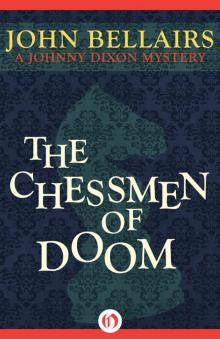 Chessmen of Doom
Chessmen of Doom Secret of the Underground Room
Secret of the Underground Room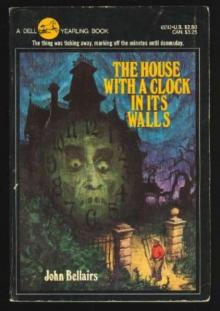 The House With a Clock in Its Walls
The House With a Clock in Its Walls The Vengeance of the Witch-Finder
The Vengeance of the Witch-Finder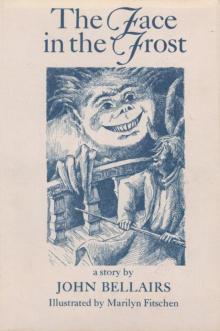 The Face in the Frost
The Face in the Frost Revenge of the Wizard's Ghost
Revenge of the Wizard's Ghost Spell of the Sorcerer's Skull
Spell of the Sorcerer's Skull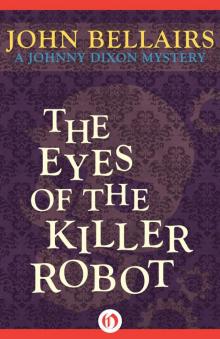 Eyes of the Killer Robot
Eyes of the Killer Robot Mummy, the Will, and the Crypt
Mummy, the Will, and the Crypt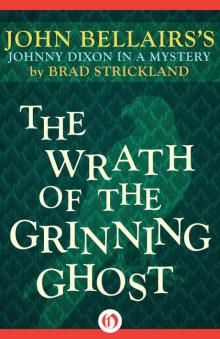 Wrath of the Grinning Ghost
Wrath of the Grinning Ghost The Mansion in the Mist
The Mansion in the Mist The Doom of the Haunted Opera
The Doom of the Haunted Opera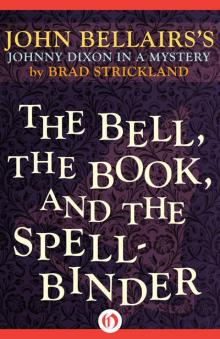 The Bell, the Book, and the Spellbinder
The Bell, the Book, and the Spellbinder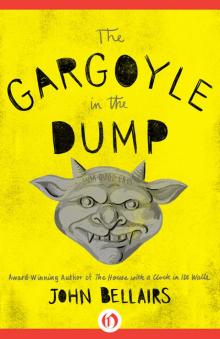 The Gargoyle in the Dump
The Gargoyle in the Dump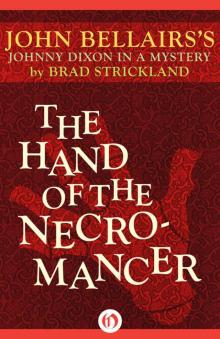 The Hand of the Necromancer
The Hand of the Necromancer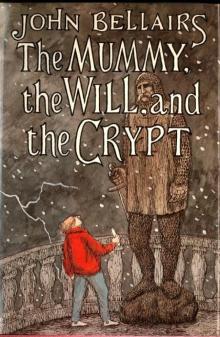 The Mummy, the Will, and the Crypt
The Mummy, the Will, and the Crypt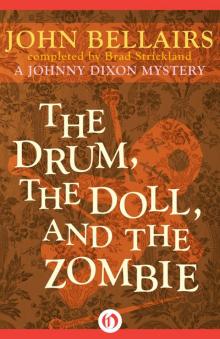 Drum, the Doll, and the Zombie
Drum, the Doll, and the Zombie The Specter from the Magician's Museum
The Specter from the Magician's Museum The Letter, the Witch, and the Ring
The Letter, the Witch, and the Ring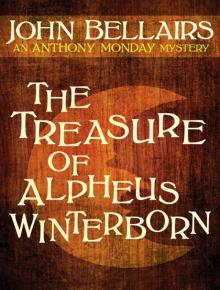 The Treasure of Alpheus Winterborn
The Treasure of Alpheus Winterborn The Dark Secret of Weatherend
The Dark Secret of Weatherend The Figure in the Shadows
The Figure in the Shadows